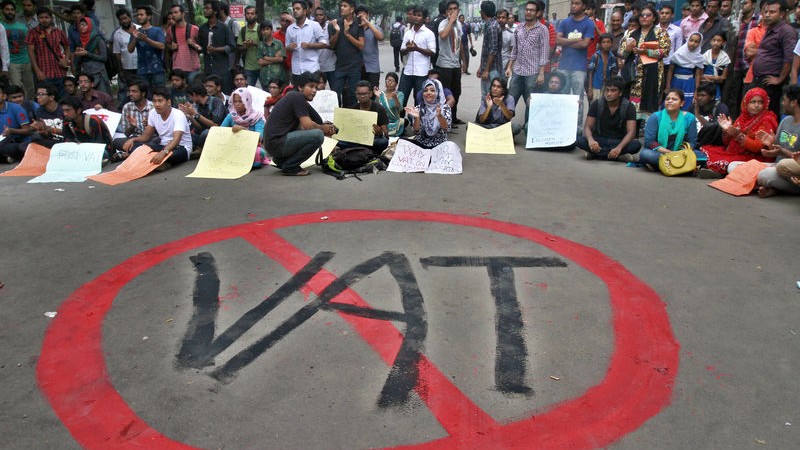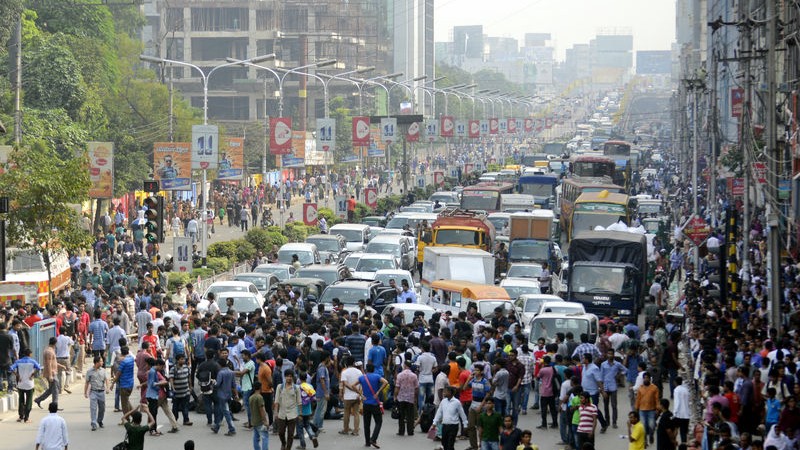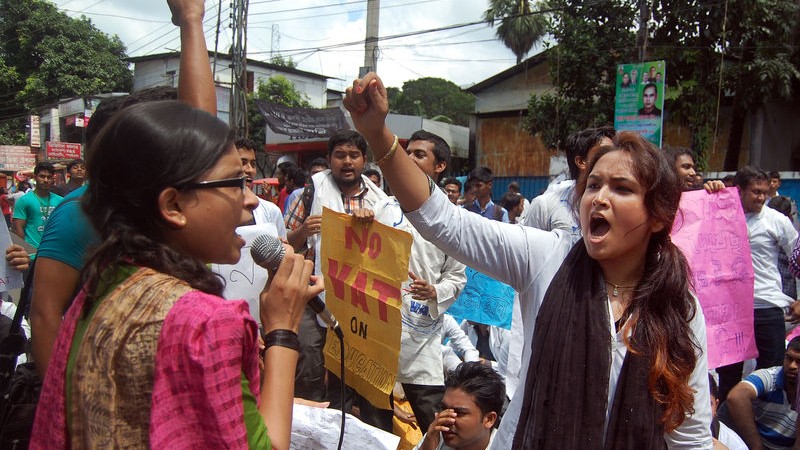
Private university students are protesting against the imposition of VAT on tuition fees. Dhaka, Bangladesh. Images by Reza Sumon. Copyright Demotix (10.09.2015)
Should there be value-added tax on education? This is the talk of the country in Bangladesh these days. On Thursday, September 10, 2015, agitating students of private universities staged rallies across the capital Dhaka, protesting the police action on an earlier student demonstration in Rampura. Following the protest rallies on Thursday, a huge traffic jam was created across the capital and several other cities in the country, triggering untold troubles for the commuters.
On September 9, hundreds of university students blocked the capital’s Badda Link Road near Aftabnagar, demanding the withdrawal of the 7.5 percent value-added tax (VAT) imposed on private university tuition fees. Twenty three students and a deputy registrar of East West University were injured when the police opened fire and used charged truncheons.
East West Students report disproportionate use of force by police #NoVatOnEducation protests #Bangladesh @Saimum12 pic.twitter.com/OGa9wyvUwx
— Chaumtoli Huq (@lawatmargins) September 10, 2015
The government initially proposed a 10 percent VAT on private universities in the budget plan for 2015-16. The students immediately protested, and in July the VAT was reduced to 7.5 percent upon the request of Prime Minister Sheikh Hasina. Since then, students of private universities have kept up their protest activities and came up with the slogan “No VAT on Education,” which has gained momentum and even turned into a hashtag on social media.
According to the University Grants Commission of Bangladesh, the regulatory and granting authority to public sector universities, currently there are 84 private universities in the country. The number of students enrolled in private schools is 314,640.
Generally, the cost of tuition in private universities is significantly higher than in public schools. Students pay roughly around BDT 700,000 ($9,000) for a four-year degree and diploma from a private university. The fee for students of private medical schools is almost twice the amount, hovering around BDT 1,400,000 ($18,000). The VAT on such fees can reach around BDT 52,500 ($675), which is roughly equal to an average fee for one trimester. The new tax levied would be an additional burden to the students and their families’ education expenses.
Osama Bin Noor tweeted:
My father is not an ATM booth! We demand “NO VAT ON EDUCATION”. #education #vat #Bangladesh #protest pic.twitter.com/q879mBIBAZ
— Osama Bin Noor (@OsamaBinNoor) July 6, 2015
Raisul reminded the government that education is a basic right of any Bangladeshi citizen:
Applying 7.5% Vat on Education Is a foolish action. Education is basic right not a Product !! #NoVatOnEducation pic.twitter.com/3Hax6DRFCi
— Ràí Sùl (@sul_rai) September 10, 2015
Not only students took issue with the new tax. People from all walks of life criticized the government's decision and had strong words for the authorities on Twitter:
#Bangladesh Constitution requires free universal education, but #govt proposes tax on education #NoVatOnEducation pic.twitter.com/ZWfKcLYPsZ
— Chaumtoli Huq (@lawatmargins) September 10, 2015
“Education is an investment, not a kg of roshogollas” #NoVatOnEducation
— Imran Rahman (@imran_r) September 10, 2015
Nazim Farhan Chowdhury questioned how much money the government would make by imposing VAT on tuition fees of private universities:
A question to ask is how much actually is the government hoping to earn from this levy? Could we not get that from somewhere else? Like if we stopped pavement beautification work, or not buying fancy SUVs for ministers, or even deciding we rather have a educated nation opposed to a warship?
Anu Muhammad, a professor of economics from Jahangirnagar University, wrote on Facebook:
ব্যক্তি বা গোষ্ঠী মালিকানাধীন বাণিজ্যিক বিশ্ববিদ্যালয়ে বেতন ফি অনেক বেশি। তার মানে এটা নয় যে, এখানে যে শিক্ষার্থীরা পড়ে তারা সবাই স্বচ্ছল বা বিত্তবান পরিবারের সন্তান। বরং অধিকাংশই মধ্যবিত্ত নিম্ন মধবিত্ত পরিবার থেকে আগত। সর্বজন বা পাবলিক শিক্ষা প্রতিষ্ঠানে স্থান সংকুলানের অভাবে এসব প্রতিষ্ঠানেই ভর্তি হচ্ছে তারা, বাজার বুঝে এ ধরনের বিশ্ববিদ্যালয়ের সংখ্যাও অনেক বেড়েছে। ধারদেনা করে, জমিজমা বেচে, বাড়তি কাজ করে অভিভাবকেরা সন্তানকে পড়াচ্ছেন যাতে সন্তানের অবস্থা বদলায়, তাদের মতো না থাকে।
Tuition fees of private universities are too high. But that does not mean that students who are studying in them come from wealthy families. Most are coming from middle and lower middle class families. They resort to private universities because the seats of public universities are limited. Considering the market demand, the number of such universities has increased in recent times. The families of the students have to stretch far to fund the tuition fees by working extra times or selling properties. They do it with the hope that their kids will do better than them in the future and won't have to struggle like them.

Students of a private university blocked the road at Banani on Thursday, September 10, demanding withdrawal of VAT imposed on tuition fees. Image by Sourav Lasker. Copyright Demotix (10/9/2015)
The students were also angered by some statements from the country's finance minister Abul Mal Abdul Muhith, who argued in favor of imposing the VAT. According to him, every student spends on average around TK 1000 per day, and the tax would only be TK 75 of that for them. But Nazia Manzoor, a teacher from East West University of Bangladesh, argued on her Facebook page that not all students of private universities came from rich families:
I have students who struggle to pay the tuition fee—after giving tuitions, working two jobs and working the graveyard shift at call centers. I have had kids beg me or another faculty member for that A because without it they'd miss that scholarship and will just not be able to continue their education. I have seen kids walk around the corridors of our office rooms with an application in hand asking for financial assistance from us. Kids drop out. Often enough. The university doesn't officially allow students to sit for exams unless they've paid their dues. […]
In the face of mass student protests, the National Board of Revenue (NBR) issued a press release, where they stressed that it would not be the students, but the private universities who would pay the 7.5 percent VAT imposed on the tuition fees, and that the universities would not raise the fee to compensate for additional expenses.
Fahim Mashroor pointed out a controversy in NBR's statement: if VAT should be paid by the university authorities, it would require a change in the current VAT law:
কেউ যদি বলে যে ‘ভ্যাট’ শিক্ষার্থীরা দিবে না বিশ্ববিদ্যালয় দিবে, তাদের আর যাই হোক ‘ভ্যাট’ সম্পর্কে বিন্দুমাত্র ‘তাত্বিক’ বা ‘ব্যবহারিক’ জ্ঞান নেইI যদি বিশ্ববিদ্যালয় কোনো টাকা সরকারকে দেয় সেটি কোনভাবেই ‘ভ্যাট’ নয় – সেটি ‘আয়কর’ (যেটি ‘মুনাফা’ বা ‘লাভের’ উপর হয়)I এটি করতে হলে প্রাইভেট বিশ্ববিদ্যালয় আইন পরিবর্তন করতে হবে – ‘অলাভজনক’ থেকে ‘লাভজনক’ করতে হবেI আর যদি এটিকে ‘ভ্যাট’ বলা হয় – তাহলে সেটি যেই দেকনা কেন সেটি ছাত্রদের উপরেই বর্তাবে I
If someone says that university authorities will pay Value Added Tax (VAT), not the students, they have neither a “theoretical,” nor a “practical” idea about it (Editor's note: A VAT is like a sales tax in that ultimately only the end consumer is taxed – source: Wikipedia). If universities pay any amount of money to the government, it will be tax, not VAT. To do that, you need to change the law (on the status) of private universities—from non-profit to profitable organizations. And if we call it VAT, then it should only be imposed on the students.
Rajesh Karmakar opposed the imposition of VAT on education. He also questioned the commercial nature of private universities, which he said often find a variety of excuses to earn money:
কিন্তু কিছু প্রশ্ন থেকে যায় এরপরও;
# বিশ্ববিদ্যালয় প্রশাসন যখন প্রতি বছর ১০ থেকে ২০ পারসেন্ট হারে কোর্স ফী বাড়ায় তখন কেন চুপ থাকি আমরা?
# এই ফী, সেই ফী, এটা সেটার নামে টাকা আদায় করে তখন কেন রাস্তা আটকাই না?
# চার বছরের কোর্সে বিশ্ববিদ্যালয় ভেদে চার লাখ থেকে পনের লাখ টাকা পর্যন্ত লাগে। এত বিরাট ফারাক নিয়ে কোন কথা তুলিনা কেন? এটা কি একটা যৌক্তিক জায়গায় থাকতে পারেনা?
But still some questions remain (about these protests);
While the university administration increases course fees from 10 to 20 percent each year, why do we remain silent?
When they cite a variety of excuses to earn money, why do we not block the roads in protest?
For a four-year long course some universities charge BDT 400,000 taka (US$5,000), some university take 1500,000 taka (US$19,000). Why do we not question such a big gap? It cannot be logical.

Students of private universities in Sylhet participate in an ongoing protest, demanding the withdrawal of 7.5 percent VAT on education. Image by H.M. Shahidul Islam. Copyright Demotix (12/9/2015)
According to the latest reports, the students of private universities have announced a three-day general strike at all private campuses across the country, demanding to withdraw the VAT. Students have also called upon the University Grants Commission to formulate a timely and student-friendly policy on tuition fees immediately to end the prevailing crisis. The Association of Private Universities of Bangladesh (APUB) has also called upon the government to review its decision to impose VAT on the universities.
#NoVatOnEducation Protest of All Private University Students for Removing 7.5% Vat on Dhaka from Tomorrow 10 A.M Onwards!!
— Manik Farhan (@Manik_Farhan) September 12, 2015
In 2010, the government had already attempted to impose a 4.5 percent value-added tax on private universities in Bangladesh, but was forced to withdraw the decision in the face of severe student unrest and mass protests.
Update: In the face of continuous student protests in Dhaka and other cities, the government withdrew the 7.5 percent VAT imposed on the fees of private universities. On 14 September 2015, the finance ministry issued a statement announcing the decision. After that, the protesting students ended their blockades.







3 comments
Private University is a non-profit organization as declared by Government. If the University really make profit from students then semester fees and other charges should be decreased accordingly. It will be helpful for students as well as their parents. Students have every right to get return of the profit made by University from students money or University must provide a good number of scholarship for the poor and meritorious students for spending the profit. But, Government cannot share the University profit as this profit money is accumulated from students pocket.
Govt. starts imposing VAT from Private University and then it will be imposed for Private College and then Private School. It is our bad luck for imposing VAT in education sector.